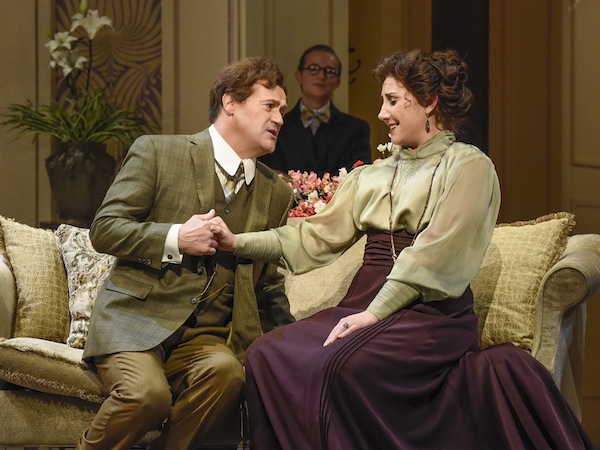Dallas Opera delights with cross-genre Korngold double bill

Paul Groves and Laura Wilde in Korngold’s “The Ring of Polykrates” at Dallas Opera: Photo: Karen Almond
Erich Wolfgang Korngold’s rarely performed one-act comedy The Ring of Polykrates proved an absolute delight in a handsome new production presented by Dallas Opera Friday night at Winspear Opera House.
Korngold earned his place in the annals of music history as a Holocaust refugee in Hollywood, where he practically invented the modern film score in the 1930s and ’40s. However, before moving to America, he had produced several substantial operas, most famously the dark (and gorgeously scored) Die tote Stadt, which Dallas Opera presented in 2014. Before Die tote Stadt, while still a teenager, Korngold wrote The Ring of Polykrates, completely opposite of Die Tote Stadt in mood but equally rich in skilled vocal and orchestral writing.
The Ring of Polykrates is a cousin to Viennese operettas of Johann Strauss, and to the comedies of Mozart and Rossini. Yet Korngold’s opera is built on a much simpler, almost parable-like plot, in which a man, at the urging of a jealous friend, tests the patience and fidelity of his wife. Korngold sets this up with a very small cast including the principal couple, a pair of servants who echo and reflect the foibles of the main couple, and the oily friend.
Musically, The Ring of Polykrates is a close relative of Richard Strauss, Wagner, and Puccini in its chromatic harmonic language, use of leitmotif, seamless progression of short arias and ensembles, and unfailingly colorful orchestration. Packed into a single act of slightly more than an hour in length, The Ring of Polykrates offers a perfect balance of content and structure.
Soprano Laura Wilde in the role of Laura, the wife, provided the strongest vocal and dramatic performance of the evening. Experienced in Wagnerian roles, she provided a sturdy but beautiful tone to match the sometimes thick orchestration. She likewise owned the dramatic aspects of the part magnificently, knowingly patient of her husband’s initial verbal insinuations before turning into a calmly angry goddess.
Tenor Paul Groves countered in the role of the husband Wilhelm as gullible and humorously paranoid; he was almost equally strong vocally, with some small mishaps in the upper range.
Soprano Susannah Biller and tenor Brenton Ryan as the servants were the first to appear on stage, and were initially slightly overshadowed by the orchestra, though this adjusted quickly. Ryan in particular had the most obviously comical role, playing up the running joke of his character’s obsession of playing the timpani in the symphonies of Haydn.
Bass-baritone Craig Colclough opted to present the conniving friend Peter as awkwardly unlucky; he discovered the comedy in those thick German consonants while preserving the natural beauty of tone in his voice.
For this new production, set designer Donald Eastman provided a spacious, upscale parlor emblematic of an upper-class European household in the early 20th-century, at the time of the opera’s premiere. Small portraits of Beethoven, Schubert, and Mahler decorated the walls. Tommy Bourgeois’s costumes likewise reflected comfortable pre-World War I life, and director Peter Kazaras found just the right touch of mild visual touches to enhance the inherent dignified humor of the work. Conductor Emmanuel Villaume guided the musical aspects with confident fluidity, producing a sparkling rendition of this late romantic score.
A performance of Korngold’s post-Hollywood Violin Concerto, a lyrically dazzling piece made famous by Jascha Heifetz, prefaced the opera. French iolinist Augustin Dumay joining his compatriot Villaume in lithely navigating the emotional and technical demands of the piece.
Dumay asserted a somewhat eccentric stage presence, including playing with the score. His tone is vigorous but with a tonal sweetness ideal for this 20th-century romanticism. He and Villaume conveyed the relentless yearning (with a touch of Hollywood) in the first movement, and the mournfulness eliding toward serenity in the second. Dumay shifted neatly to the dance-like energy and humor of the finale–here, Korngold comes close to his mid-century American contemporaries.
In the closing section, Villaume, Dumay and the orchestra reveled in a final burst of musical grandeur to which one could imagine Errol Flynn riding to the rescue of Olivia de Havilland in a Korngold-scored adventure film.
With this follow-up to the earlier production of Die tote Stadt, the Dallas Opera continues a worthy and admirable exploration and advocacy of the music of Korngold. Hopefully, more Korngold operas will follow in years ahead.
The Korngold double-bill will be repeated at Winspear Opera House 2 p.m. Sunday and 7:30 p.m. February 14 and 17. dallasopera.org; 214-443-1000.